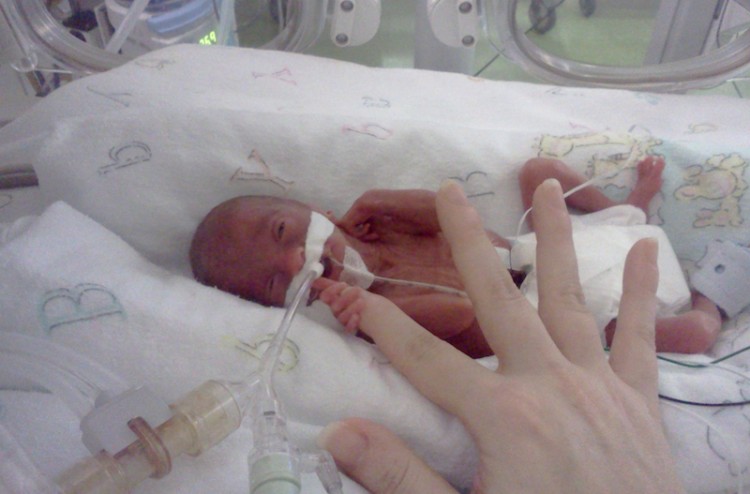I was never a writer, nor did I ever keep a journal or diary. I’m a science teacher and a mother of four beautiful children, but I discovered the feelings of freedom, power and relief that comes with writing.
I started a journal on a sheet of paper a nurse gave me the night my daughter was born. Days past before I could meet my baby. From my hospital bed with intravenous lines and bags of blood being pushed into my veins, all I could think about was the fact that my daughter might die before I ever saw her face or felt her touch. This is because my daughter was born at 23 weeks. Her name is Joy.
Twelve hours past before I awoke after her delivery. Frankly, it was a miracle I woke up at all. I’d been on bed rest for seven weeks before my emergency c-section. My placenta had implanted on my scar tissue from three previous c-sections and then decided to grow through it and attach to my bladder and bowels. They all needed to be delicately separated after doctors removed my daughter from my uterus. Then they took my uterus too.
Once I woke up from surgery, I was angry that my medical team wouldn’t let me meet my daughter. I was irate and required mediation to calm down. I refused to sleep until I could meet her. To shut me up, a surgical ICU nurse handed me a piece of paper and pen and told me to write. That was the best advice. I wrote on that paper (and additional papers) for the week I remained in the hospital.
The second day I was allowed to drive myself to visit my daughter in the NICU, I stopped at a drug store and purchased a mini notebook, which became my constant companion, and in which I recorded everything, beginning with her 1-pound 4-ounce birth weight and her 11-inch height.
Each day, for 121 days, I wrote about Joy’s progress — or lack thereof — her medications, her medical procedures and her growth. I wrote about my pregnancy, my feelings and emotions. I also wrote about my three other small children at home and what we did together and how they were reacting to Joy’s premature birth and time in the NICU. A month after Joy came home, I went to write in my notebook, but instead, I started reading everything I’d written over the previous four months. That’s when I knew I had to tell Joy’s story, and I began to put it all together into a book.
My NICU journal became my weapon against misunderstanding, as well as a tool to help me heal. No one anticipates his or her baby being admitted to the NICU, whether it’s due to premature birth or another major health issue. NICU parents are in a state of shock and don’t have the clarity needed to analyze and interpret the onslaught of medical jargon presented to them, as well as the decisions they’re asked to make.
From a health care perspective, a simple NICU journal can help arm and empower parents so they can better take care of themselves, as well as be an active participant in their baby’s care. From a personal perspective, a NICU journal can also be a place where parents document their emotions. Any length of time with a baby in the NICU can cause parents to suffer from symptoms of post traumatic stress disorder. Research shows that expressive writing can be used as a therapeutic tool. Writing about traumatic, stressful or emotional events has been found to result in improvements in both physical and psychological health.
A NICU journal can record what the medical team discusses at rounds each morning. Your baby’s nurse can fill you in if you could not be there at that time. It can also include your baby’s daily clinical information such as weight, length, fluid intake, medications, diagnostic tests, diaper contents, examinations, medical interventions and any change in the health care plan.
An informed and organized NICU parent possesses a weapon that allows them to actively participate in the care of their baby both in the present and future. A daily NICU journal allows for this as well as relieves the pressure of memorizing medical jargon, which allows a parent to relax and enjoy their visitations. Plus, the process or writing down personal feelings each day will help with the healing process, because all NICU parents need to heal.
Take away points:
- A NICU journal is an easy way to keep track of your baby’s health, allowing you the power to participate in making more informed health care decisions with your baby’s medical team.
- Research shows that expressive writing can be used as a therapeutic. Writing about traumatic, stressful or emotional events has been found to result in improvements in both physical and psychological health.
- Reading your NICU journal will remind you how far you and your baby have come.
This post originally appeared on Micropreemie.net
Want to celebrate the human spirit? Like us on Facebook.
And sign up for what we hope will be your favorite thing to read at night.


